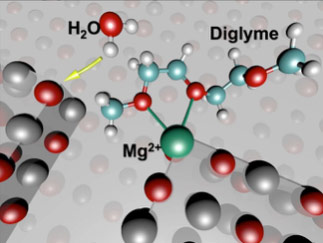
Scientific Achievement
A team of Foundry scientists and users have discovered a new kind of chemical reactivity in next-gen battery components that were previously thought to be compatible.
Significance and Impact
The discovered reactions degrade battery performance even before the battery can be charged. The findings could be relevant to other battery materials and guide the design of next-gen batteries away from such pitfalls.
Research Details
- Leveraging co-located facilities and programs at Berkeley Lab including ALS, NERSC and JCESR, Foundry staff and users combined X-ray experiments, theoretical modeling, and supercomputer simulations, to develop an understanding of the chemical breakdown of a liquid electrolyte occurring within tens of nanometers of an electrode surface that degrades performance of magnesium-based batteries.
- A self-stabilizing, thin oxide surface layer that forms on the magnesium has defects and impurities that allow unwanted reactions between the magnesium and electrolyte.
- The side reactions waste electrolyte, drying out the battery over time, and the products of these reactions foul the anode’s surface, impairing the battery’s function.

